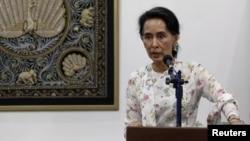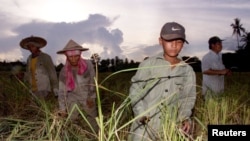Journalists attempting to cover this week’s three-day visit to Thailand by Myanmar’s de facto leader Aung San Suu Kyi will find themselves unusually constrained.
It is a high profile visit that comes as Myanmar, also known as Burma, transitions from military rule to democracy, while the opposite has occurred in neighboring Thailand.
Between 1.4 million and four million citizens of Myanmar work in Thailand, perhaps the majority of them illegally.
Reporters are being told they will have no opportunity to question Aung San Suu Kyi, even during a so-called joint news conference in Bangkok with Prime Minister Prayuth Chan-ocha, who seized power in a bloodless coup two years ago.
Limited access
Thailand’s Foreign Ministry, in an agenda sent to correspondents, also advised photographers, videographers and reporters covering the Nobel Peace Prize laureate’s visit to be formally attired “at all times,” including during her scheduled visit Saturday to a border refugee camp reachable via unpaved roads.
Most journalists, even if they show up in a tuxedo or ball gown, will not be permitted to see the Myanmar leader at the Tham Hin refugee camp as coverage has been additionally limited to “official media and pool media only.”
Aung San Suu Kyi's arrival Thursday and Saturday departure at Suvarnabhumi Airport will also be restricted "pool coverage" with only two representatives of the international media allowed to attend.
Aung San Suu Kyi’s visit with 3,000 Myanmar migrant workers at Thailand’s largest seafood market Thursday and a speech the following day at Thailand’s Foreign Ministry, are “open to all media,” although videographers are complaining about strict security measures forbidding them from carrying backpacks.
Who gave orders?
Two international video news agencies requested reconsideration of that restriction, noting crews on the move need to carry spare batteries, cables, microphones and other equipment in backpacks.
Thai MFA information department second secretary Jatupon Innachit, responding to complaints from the international media, expressed understanding, but said the restrictions are “the instructions we have received” although he declined to say from whom.
The new Myanmar government, led by Aung San Suu Kyi’s National League for Democracy, has been criticized for limiting media access since it took power in April, following last year’s landslide election victory.
Aung San Suu Kyi, who holds the titles of state counselor and foreign minister, was barred from becoming president according to the constitution enacted by the previous military government.
President Htin Kyaw, a mostly out-of-sight figurehead, is not accompanying her to Thailand.
Lack of transparency
Myanmar’s information minister, Pe Myint, last week promised reporters they would soon have more access to government ministers and acknowledged a lack of transparency.
Reporters in Naypyitaw on Monday were barred from covering a birthday celebration for Aung San Suu Kyi, who has openly demonstrated irritation with the media.
She has also been defensive about international media reports that her government is ignoring the plight of the minority Rohingya.
In a meeting Monday with U.N. special investigator Yanghee Lee the foreign minister reiterated Myanmar will continue to refrain from using the word “Rohingya,” according to Foreign Ministry permanent secretary Aung Lin.
Many in Myanmar’s dominant Buddhist community regard the Muslim Rohingya as illegal immigrants from Bangladesh.
Questions about the Rohingya would almost certainly be directed at Aung San Suu Kyi at Friday’s scheduled joint news conference with the Thai prime minister, an uncomfortable situation it appears the two neighbors have now found a way to avoid.






